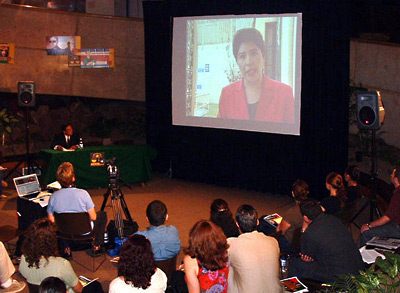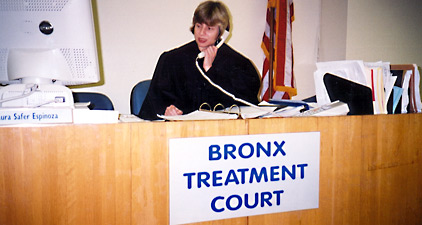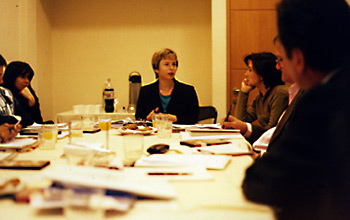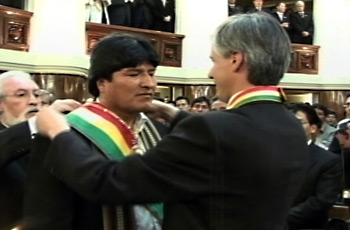 |
 |
 |
||||||||||||||
Problem Solving in an Era of Judicial Reform: The Work in Latin America
 |
Since the military returned to the barracks in Latin America and the region began its slow return to democratic governance, there has been a judicial reform movement to institute more transparent, fair and participatory judicial procedures. Criminal procedure, particularly the inquisitorial system found throughout Latin America, has often been the first set of laws to be reformed in a post-dictatorship period. Oftentimes, the criminal law was the way in which freedoms like that of association, or speech, were repressed. So it was no surprise that most Latin American countries emerging from military regimes focused on the reform of their respective criminal laws after the first set of free and fair elections. After criminal procedure comes other reforms: reforms involving police training and promotion, prison reform, family law and labor law reform, and eventually civil procedure reform.
Legal reforms should be more than just the wholesale transplantation of legal innovations or practices (for example Napoleonic codes from France, via Spain, or U.S.-inspired insider trading regulations) from a donor country to a recipient country. Legal reforms require the transfer of technology, culture, institutional know-how, jurisprudence, case management, and court procedures. In addition, local conditions, indigenous traditions, and regional context are all essential factors to consider in the adoption of legal models from abroad.
For a decade, Proyecto ACCESO at California Western School of Law has been introducing problem-solving techniques in the process of legal reform. We have introduced and facilitated a number of problem-solving courts like teen or peer court, community court, drug treatment courts and other diversion and alternative sentencing programs that reduce recidivism and criminality into Latin America. We have also assisted in the development of indigenous justice systems and their integration into the legal reform process.
For more information please visit www.proyectoacceso.com.
Drug Treatment Courts Initiative
In its efforts to stem the supply of drugs destined for the U.S. marketplace, the U.S. Government has spent billions of dollars, focusing on drug production in the Andes region of South America. The most celebrated and costly program is Plan Colombia, which has cost U.S. taxpayers more than five billion dollars. It is no secret though that these initiatives have not worked very well across the Andes. Working to solve this problem, Proyecto ACCESO has focused its efforts on the stemming demand. Drug treatment courts, the alternative sentencing regime for lower level drug possession crimes that focuses on rehabilitation rather than incarceration, has been a successful U.S. judicial innovation focusing on the demand side of the War on Drugs. Proyecto ACCESO has introduced these problem-solving courts into South American legal cultures since 2004.
|
Desde una Editorial “Alternativa a la guerra contra las drogas” en El Mercurio (Chile) (pagina A2, el 16 de marzo, 2007)
por Prof. James Cooper,
Director de Proyecto ACCESO:
Después de una exitosa implementación de la reforma procesal penal, Chile esta listo para otra innovación judicial: las “cortes de drogas” o “tribunales de tratamiento”.
Los tribunales de tratamiento son una alternativa a la guerra contra las drogas, una invención de los EE.UU. Desde los años 70, la guerra contra las drogas ha costado a los EE.UU. más de 500 mil millones de dólares americanos. También, con las nuevas políticas sobre la criminalización de las drogas, millones de personas - en su mayoría negros y hispanos - están en la cárcel cumpliendo condena, en proceso de ser encarcelados o en periodo de libertad condicionada.
Desafortunadamente, la industria de las drogas y la adicción a las mismas continúan creciendo sin límites. Hasta ahora, la guerra contra las drogas no ha sido un éxito. Es en este contexto se crean las cortes de drogas, que proporcionan salidas alternativas para conducir a un imputado a un tratamiento, y no a la cárcel. Los imputados, bajo la amenaza de cumplir una pena de cárcel, dejan de consumir drogas; abstinencia que es controlada mediante exámenes clínicos periódicos que son informados al juez. Se trata de una herramienta alternativa que permite resolver la adicción, prevenir el crimen y reducir la delincuencia, tal como las cifras lo demuestran.
Para establecer un punto de referencia de la tasa global de reincidencia nacional, el Instituto Nacional de Justicia de los EE.UU. realizó un seguimiento a una muestra de 2.020 ‘graduados’ de 95 tribunales de droga en los años 1999 y 2000. El estudio arroja que, después de cumplidos sus procesos, sólo el 16.4% de los imputados ‘graduados’ d
e los tribunales de droga ha sido arrestado y acusado de un delito grave pasado un año y 27.5%, al cabo de dos años. Otros estudios de casos en Oklahoma, Nueva Jersey, y Florida demuestran que los tribunales de droga resulta más eficiente, en términos de costos, que el encarcelamiento de los infractores por abuso de drogas. A partir de 2006, había 1.557 tribunales de droga funcionando en Estados Unidos y existían otros cientos más en la fase de planificación. Este mecanismo para resolver el problema de adicción a las drogas y sus externalidades negativas ha sido todo un éxito.
El que Chile haya decidido desarrollar modelos, como aquellos en marcha en Valparaíso y las zonas dependientes de las Fiscalías Metropolitanas Sur y Centro Norte, constituye un gran paso para abordar mejor la drogadicción en Sudamérica. Mientras el gobierno de la Presidente Bachelet trabaja para extender los tribunales de droga por todo el país, es importante involucrar a todas las partes interesadas, desde los proveedores de servicio social hasta las autoridades policiales.
Pese a ello, existen muchos temas que el sistema legal y los servicios sociales deben resolver. Entre ellos, decidir si se intentará aprobar una nueva ley especial, o se preferirá usar las leyes - Código Procesal Penal y Ley de Responsabilidad Penal Adolescente – que ya existen. Los programas piloto de tribunales de tratamiento en Chile –tanto con adultos como adolescentes- han escogido emplear la suspensión condicional del procedimiento y el control judicial se incorpora producto del acuerdo de imputado y fiscal, aprobado por el juez, conforme las normas actualmente vigentes. Tal vez sea importante crear reglas que permitan mejorar la retención de los imputados que requieran internación inmediata para el tratamiento, o que regulen de mejor modo la flexibilización de las condiciones a que se somete al imputado en la medida que vaya progresando en su mejoría.
Sin embargo, se trata de detalles para abogados y jueces, que se pueden resolver, con requerimientos presupuestarios, de planificación y ejecución que se encuentran al alcance de Chile. Sólo mediante un enfoque integrado dirigido a la rehabilitación y la responsabilidad personal, y en que las instituciones involucradas trabajen en modo coordinado, pueden funcionar bien programas de derivación como estos.
Los tribunales de tratamiento tienen resultados exitosos, devuelven a los imputados la libertad que les ha arrebatado la droga y son, además, eficientes en el sentido económico. Y son, también, una mensaje fuerte que demuestra que en la lucha contra la adicción y el crimen, necesitamos muchos tipos de armas.
 |
||
Leading an ACCESO Capacitación workshop on drug treatment courts in 2004, Hon. Laura Safer Espinoza helped launch Chile’s first pilot treatment court in Valparaiso. She gave the keynote address at that country’s first national conference on treatment alternatives to incarceration in 2006, which was sponsored by the United Nations Office on Drugs and Crime, Fundación Paz Ciudadana and the Carabineros, Chile’s national police force. Judge Safer Espinoza has also lectured on the treatment court alternative in Brazil, as a U.S. State Department consultant in 2005, and introduced the idea at a conference concerning drug policy in Bolivia in 2006 co-sponsored by the Bolivian Ministry of Justice and Proyecto ACCESO.
 |
Judge Safer Espinoza explains:
“I have been the presiding judge of Bronx Treatment Court since its inception in 1999. After nine years of adjudicating criminal proceedings, I fully realized that ‘business as usual’ had few answers to the problems affecting most people in the criminal justice system - issues of addiction, mental health and lack of educational or employment opportunities. In treatment court we would leave the adversarial process aside, and unite in the effort to put peoples’ lives on track.
Clients in treatment court are given the opportunity to attend drug and mental health treatment, as well as to enroll in school, job training and/or full time employment. If they comply with our requirements, cases are either dismissed or reduced to lesser charges for which incarceration is not mandatory. Our clinical staff assesses the treatment needs of clients, places them in appropriate programs and helps to monitor their progress. During their time in treatment, clients are carefully followed through regular court updates, where they come before the judge. A system of graduated sanctions and rewards is utilized during those sessions - ranging from ‘promotions’, certificates and public praise, applause and handshakes from the judge for program compliance; to increase of treatment intensity, length and modality; observing in court; writing essays; and periods of incarceration for failure to abide by the prescribed treatment protocols.
 |
This system is driven by the belief that relapse is part of recovery. After numerous opportunities, however, if a client fails, or is re-arrested and charged with another crime, they are sentenced to prison.
Our court has successfully ‘graduated’ over 1,000 clients and recidivism has been drastically reduced. In addition to tremendous savings of taxpayer dollars as a result of clients who are employed as opposed to incarcerated, there are other dramatic achievements. Family reunification, mental health issues that are properly addressed instead of self-medicated, increase in self-esteem and the birth of hundreds of healthy babies are a few examples. Problem solving can be exhausting - and no one protocol fits all, but it is also incredibly rewarding.”
Focus on Indigenous Justice Systems: La Ley Comunitaria
 |
Since the December 2005 election of President Evo Morales and his MAS party to power indigenous groups, traditionally the marginalized and dispossessed throughout Latin America, have become an important political and legislative force. With the indigenization of Bolivian ministries and newly focused policies, international aid agencies and foreign governments working with state authorities on judicial and other reforms in Bolivia must change their respective approaches. The New Political Constitution of the State of Bolivia (Nueva Constitución Política del Estado de Bolivia), approved by national referendum on January 29, 2009, provides for many more rights for indigenous groups, sovereignty over the country’s natural resources, and education and social services in their respective traditional languages.
 |
A new justice system, based on communitarian law, is also part of the new Constitution. After hundreds of years of oppression, and control by judicial procedures that are far different from their ancient problem solving methodologies, it is little surprise that the three major indigenous peoples of Bolivia – the Aymará, Quechua and Guaraní- have long resisted the judicial reforms introduced to the region.
This presented Proyecto ACCESO with an opportunity to ensure that indigenous peoples are no longer excluded from the political process.
The ACCESO team has spent many years building bridges between traditional indigenous problem-solving mechanisms (non-violent forms of dispute resolution) and criminal procedure reforms.
ACCESO Indígena assists the Bolivian peoples - 80 percent of whom identify themselves as indigenous - by undertaking a cultural translation of the problem-solving mechanisms of indigenous peoples, and creating training programs for the administrators of the community justice programs. We are studying the application of indigenous justice and are working with local indigenous leaders and the Association of Municipal Governments to develop models for the management of indigenous justice. We have worked with the Government of Bolivia’s TV Congreso (a part of the Vice-Presidency of Bolivia), launched a website that offers educational opportunities throughout the Andean region, and developed an interactive DVD and public education materials and a public service announcement for REPAC, the President’s Representative to the Constituent Assembly negotiations, which produced the New Political Constitution of the State of Bolivia. In short, Proyecto ACCESO has been researching and assisting in the re-employment of traditional problem-solving mechanisms in the judicial reform process.
By combining respect for their ancient cultures, languages and traditions with the integration of current judicial reform, we shall continue to empower the Bolivia’s indigenous peoples while still protecting due process and other fundamental human rights.
ACCESO’s relationships with a wide range of indigenous groups including the Guaraní, Aymará, and Quechua have built on our work in the Southern Cone on indigenous legal defense programs over the decade. ACCESO trained the team of public defenders who successfully defended the Mapuche leaders in an internationally followed trial. In 1999, we created a legal clinic to mediate disputes in Temuco, the capital of the IX Region of Chile. For years we have worked from La Paz, Bolivia to Arica, Chile with Aymara leaders in community building and problem-solving efforts.
Our work in partnership with a number of local authorities, non-governmental organizations, indigenous solidarity groups, foreign governments, regional institutions, and international aid agencies throughout the region have provided educational tools to indigenous communities to train their future advocates.
|
copyright 2012 CWSL all rights reserved